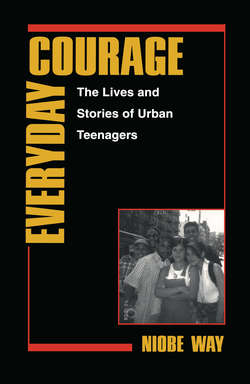Читать книгу Everyday Courage - Niobe Way - Страница 14
На сайте Литреса книга снята с продажи.
Theory Testing
ОглавлениеThe developmental theories of Sigmund Freud, Jean Piaget, Harry Stack Sullivan, John Bowlby, Mary Ainsworth, and Erik Erikson form the very meaning of “development” in the field of psychology. It is largely within these particular theoretical frameworks or several others depending on one’s question or population of interest that researchers are expected to work when they conduct developmental research.15 Developmental researchers are expected by others in the field to use a preestablished developmental theory—a theory that has been validated as representing a “real” phenomenon in development—to frame their research questions or to make sense of their data. To proceed without such a theoretical framework is frequently regarded as “unscientific,” “atheoretical,” or “not theoretically grounded.”
While social scientists over the past thirty years have emphasized the importance of data-driven or grounded theory—theory that is built upon what is perceived in the data rather than theory that drives the interpretation of the data—developmental psychologists have typically continued to believe that the only valid knowledge is knowledge generated by testing theories. There has been a general neglect of “discovery research”—research that aims to discover rather than to test, prove, or explain. If one’s intention is to test a specific theory, using a particular theory to frame one’s research is clearly the appropriate path to take. However, if one’s intention is to listen for developmental patterns, especially among a population that has rarely been studied by researchers, using a preestablished developmental theory to examine one’s data does not make sense.16
Theory or hypothesis testing hinders researchers’ abilities to perceive the unique experiences of those in their study and makes it harder for them to see the complexities and contradictions in lived experience. A researcher may, in fact, become all but blind to such complexities by looking only for data that fit a theory rather than a theory that fits the data. In a compelling and convincing critique of the social sciences, Albert Hirschman lashes out at the “the compulsive and mindless” theorizing. He emphasizes that connections must come from the material itself and not from a presupposed theory of explanation:
[I recommend] a little more reverence for life, a little less strait jacketing of the future, a little more allowance for the unexpected—and a little less wishful thinking. … I am of course not unaware that without models, paradigms, ideal types and similar abstractions we cannot even start to think. But the kinds of paradigms we search for, the way we put them together, and the ambitions we nurture for their powers—all this can make a great deal of difference.17
While I sought, in my own study, to create theories from my data, I do not claim, following Hirschman, to begin my research from an atheoretical position. Given that my position as a researcher is bound up with the theories of my particular field, to claim such a starting point would clearly be naive. However, instead of deciding in advance which developmental theory would be most useful, I adopt a stance of theoretical openness. I am not looking for an assumption-free discovery, nor am I rejecting the usefulness of theory or hypothesis testing research; I am attempting to expand our theories to include context-sensitive and data-driven models of adolescent processes.
Martin Heidegger, whose work has greatly influenced and provoked much of the current interest in the interpretive turn, writes:
[The hermeneutic circle] is not to be reduced to the level of a vicious circle or even a circle which is merely tolerated. In the circle is hidden a positive possibility of the most primordial kind of knowing. To be sure, we genuinely take hold of this possibility when, in our interpretation, we have understood that our first, last, and constant task is never to allow our fore-having, foresight, and fore-conceptions to be presented to us by fancies and popular conceptions, but rather to make the scientific theme secure by working out these fore-structures in terms of the things themselves.18
I interpret Heidegger as warning against the adherence to a theory or “popular conception” that is out of relationship with what or whom one is studying. My “constant task” as a developmental researcher is to base my theories on the data themselves as opposed to basing my understanding of the data on what I have been told is knowledge or “valid” theory. This phenomenological process will lead, I believe, to a deeper understanding of the experiences to which I am listening—“a most primordial kind of knowing.”
